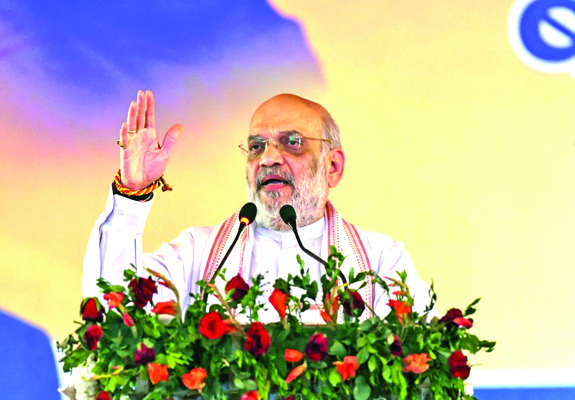
STATE TIMES NEWS
BHOPAL: In a veiled swipe at previous Congress-led governments, Union minister Amit Shah said on Sunday that the cooperative movement had remained in shambles as laws were not tweaked for years and “almost died” until the Modi government took decisive action.
Addressing a state-level cooperative conference in Bhopal, Shah said the erstwhile governments never considered bolstering the cooperative sector.
On the occasion, an agreement was signed between the National Dairy Development Board (NDDB) and Madhya Pradesh State Co-operative Dairy Federation to enhance milk production in the state. “For years, the cooperative movement was moving slowly and turned almost dead. Looking at the cooperative movement nationwide, it was uneven (in the past),” he said.
Highlighting the challenges, Shah said the cooperative movement had remained in shambles as laws were not tweaked accordingly.
He said the movement gained traction only after 75 years of independence when Prime Minister Narendra Modi formed the Ministry of Cooperatives to strengthen the sector.
Shah blamed previous Central governments for not boosting the cooperative sector, which resulted in lopsided growth.
“In some states, the movement gained momentum, while in some places, it has been destroyed. The main reason was that the laws, which should have been changed with time, were not tweaked,” Shah said while crediting PM Modi for bringing a “positive change” in the cooperative movement.
Madhya Pradesh has a lot of possibilities in the agriculture, animal husbandry and cooperative fields, Shah said, acknowledging the need to undertake more efforts to exploit these possibilities to the fullest.
“Madhya Pradesh is seeing good governance now. The cooperatives were almost dead during the Congress regime. This is a golden opportunity for their revival and Madhya Pradesh should take this opportunity,” he said.
As cooperation is a state subject under the Constitutional arrangement, initiatives were not taken to frame cooperative laws adapting to rapidly changing conditions across the country.
“This (scenario) was not considered from a holistic perspective at the national level, because there was no separate ministry for cooperatives,” he said.
Noting that the Centre works within the Constitutional framework, Shah said the Union Government has enacted model bylaws for cooperatives, which are accepted by all states.
“By accepting these model bylaws that empower primary societies, states have given a new lease of life to the cooperative sector in India,” he said while thanking the States.
Shah recalled how PAX (or PACS- Primary Agriculture Credit Society) used to work in short-term agriculture finance and earned only a half per cent profit.
“The same PAX are doing more work which has raised their income. They are selling medicines cheaper by joining Ayushman Bharat and also involved in water distribution, making more than 300 government schemes available to the public by joining CSC (Common Service Centres),” he said.
Shah hailed Madhya Pradesh government for being the first in India to computerise PAX.
The Union Minister stated that previously, only large-scale farmers could engage in seed farming. However, the government has now extended the opportunity for seed production to farmers with land holdings as small as two-and-a-half acres.
He emphasised that the conservation and promotion of seeds would be managed by the ‘Seed Cooperative,’ ensuring farmers receive fair prices for their produce.
Speaking on milk output, Shah said, Madhya Pradesh produces 5.5 crore litres of milk, accounting for 9 per cent of the country’s total milk production.
The minister highlighted the exploitation farmers face when selling milk in the open market. “To address this, the government aims to encourage farmers to sell milk through cooperative dairies, ensuring that profits directly benefit them,” he said.
The minister expressed confidence that the agreement between NDDB and MPSCDF will form cooperative societies in approximately 50 per cent of Madhya Pradesh’s villages, providing swift benefits to farmers and animal herders.
Shah said less than one per cent of Madhya Pradesh’s milk production comes from cooperative dairies. The surplus milk in the state amounts to 3.5 crore litres, of which only 2.5 per cent is handled by the cooperative sector.
“In villages, only 17 per cent of milk collection is possible. However, the agreement signed on Sunday paves the way for NDDB to reach 83 per cent of villages in the state. Over the next five years, the goal is to establish primary milk production committees in at least 50 per cent of villages,” Shah said.
He called for swiftly connecting every farmer with cooperative dairies to produce milk, curd and buttermilk.
Shah said the Modi government is “standing like a rock” in supporting the cooperative sector expansion.
“Through seed, organic, and export cooperatives, farmers are receiving fair prices for their produce. These cooperatives provide farmers with a platform to access the global market, with profits directly deposited into their bank accounts. This is a significant achievement that benefits farmers rather than traders,” he added.

